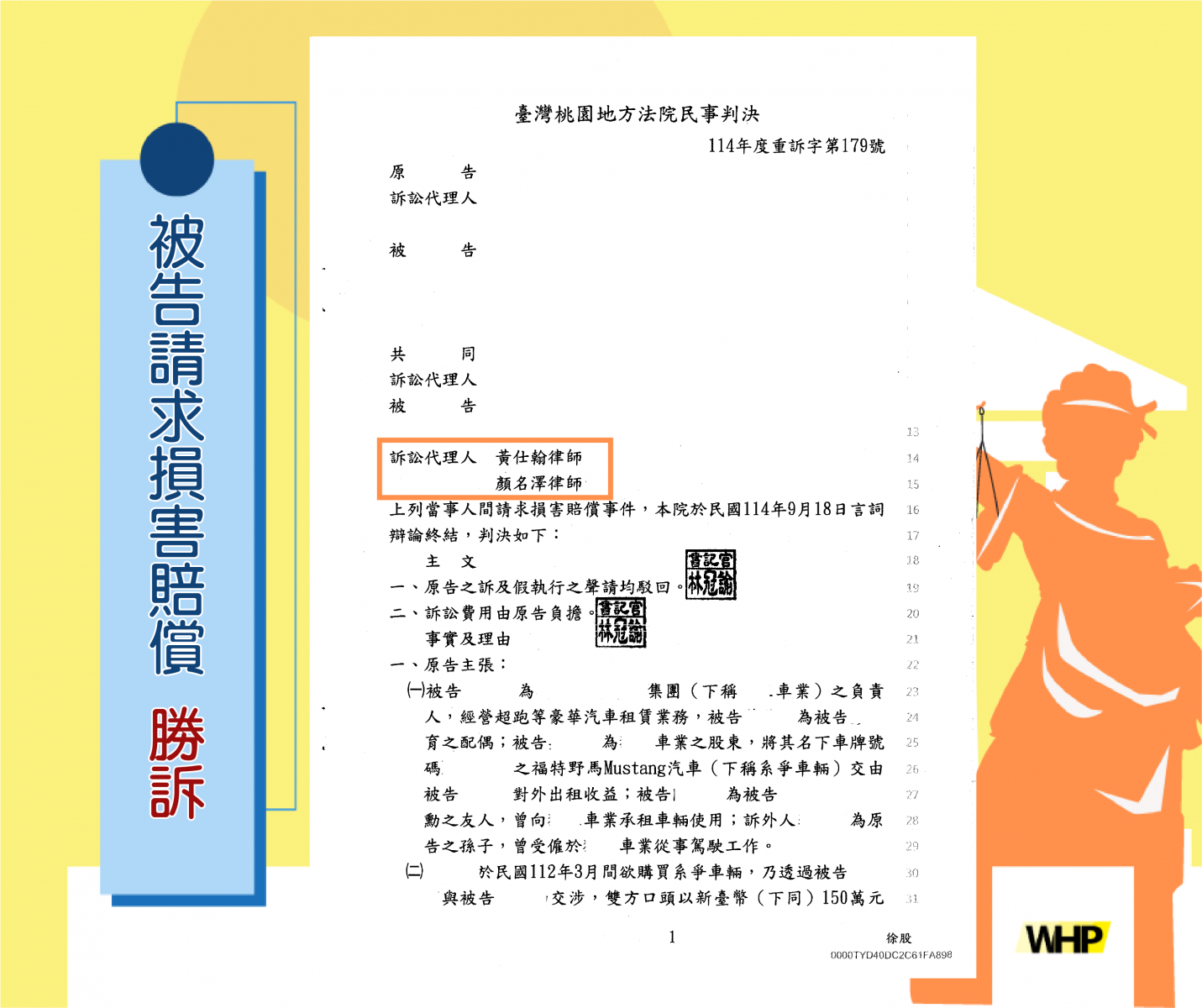首頁 >
| Civil Case | Defendant’s Claim for Damages Successful

Relevant Legal Provisions
Civil Code Article 74:Where a legal act takes advantage of another person's urgent situation, rashness, or lack of experience, causing that person to make a property-related payment or agree to make such payment in a manner that is obviously unfair under the circumstances at the time, the court may, upon petition of an interested party, revoke the legal act or reduce the payment.
Civil Code Article 92, Paragraph 1:A declaration of intent made due to fraud or duress may be revoked by the declarant. However, if the fraud is committed by a third party, the declaration may be revoked only when the counterparty knew or could have known of the fraudulent act.
Civil Code Article 179: A person who, without legal grounds, obtains a benefit at the expense of another shall return that benefit. The same applies when a legal ground once existed but no longer exists thereafter.
Facts and Reasons
The plaintiff's grandson had a dispute with the co-defendants regarding the sale of a vehicle. Because the defendant (our firm's client) was an investor in the company involved, the defendant went with several other co-defendants to the plaintiff's residence to help mediate the dispute. Later, however, they were accused of fraud, intimidation, or coercion, allegedly causing the plaintiff to suffer financial losses.
Judgment
The plaintiff's claim and petition for provisional execution were both dismissed. Litigation costs are to be borne by the plaintiff.
The plaintiff alleged that the three defendants conspired to cause the plaintiff' grandson to agree to a high penalty for breach of contract and to sign the disputed promissory note, and further used fraudulent, intimidating, and coercive means to infringe upon the plaintiff's freedom of declaration of intent, thereby causing a total payment of NT$8.27 million to the defendants. Since the defendants denied these allegations, the plaintiff bore the burden of proof to establish the elements of the alleged unlawful tortious acts.
Although the plaintiff submitted evidence such as the promissory note and the vehicle purchase agreement, these documents only proved that a contractual dispute existed between the plaintiff's grandson and the defendants concerning the disputed vehicle. As the plaintiff and the defendants met to mediate the dispute, and given that a conflict already existed beforehand, it is difficult to expect that the language used under such circumstances would be entirely calm, measured, and composed. There is no basis to infer from this that the defendants engaged in fraudulent, intimidating, or coercive actions infringing upon the plaintiff's freedom of declaration of intent or causing the plaintiff financial loss. Moreover, the witnesses' testimonies merely confirmed that the defendants—or someone—had been to the plaintiff's residence, without personally hearing any relevant conversations.
Therefore, the evidence presented by the plaintiff failed to prove that the defendants committed fraud, intimidation, coercion, or any tortious acts against the plaintiff. It cannot be said that the plaintiff fulfilled the burden of proof, and the court could not make a determination favorable to the plaintiff.
(Note: To protect the client's interests, certain case details and judgment images have been redacted and modified. For a full review of the case, please refer to Judicial Yuan's judgment database)
Attorneys:Vincent Huang、Ian Yan
-
11.25 2025
Criminal | Forgery of Documents, etc. Successfully...
-
11.18 2025
Civil Case | Defendant’s Claim for Damages Success...
-
11.11 2025
Criminal | Violation of Anti-Money Laundering Act,...
-
10.28 2025
Criminal Case | Defendant Acquitted of Hit-and-Run...
-
10.21 2025
Criminal Case | Defendant Charged with Forgery Acq...
-
10.14 2025
Assisted in the Division of Co-owned Property and ...
-
09.30 2025
Defendant – Offenses Against Sexual Autonomy Appea...
-
09.23 2025
Criminal | Defendant Charged with Embezzlement in ...
-
09.16 2025
Criminal | Case of Infringement of Sexual Privacy ...
-
09.09 2025
Request for Ownership Transfer Registration – Plai...
-
09.02 2025
Civil | Joint Construction Dispute Requesting Perf...
-
08.26 2025
Criminal | Defendant Charged with Aggravated Fraud...
-
08.19 2025
Internal Company Dispute Defendant Forged Document...
-
08.12 2025
Civil Case | Check Dishonored – Claim for Loan Rep...
-
08.05 2025
Heavy Motorcycle Rear-End Collision, Lawsuit for N...